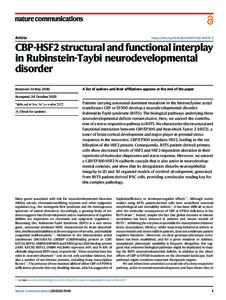CBP-HSF2 structural and functional interplay in Rubinstein-Taybi neurodevelopmental disorder
de Thonel Aurélie; Ahlskog Johanna K.; Daupin Kevin; Dubreuil Véronique; Berthelet Jérémy; Chaput Carole; Pires Geoffrey; Leonetti Camille; Abane Ryma; Barris Lluís Cordón; Leray Isabelle; Aalto Anna L.; Naceri Sarah; Cordonnier Marine; Benasolo Carène; Sanial Matthieu; Duchateau Agathe; Vihervaara Anniina; Puustinen Mikael C.; Miozzo Federico; Fergelot Patricia; Lebigot Élise; Verloes Alain; Gressens Pierre; Lacombe Didier; Gobbo Jessica; Garrido Carmen; Westerheide Sandy D.; David Laurent; Petitjean Michel; Taboureau Olivier; Rodrigues-Lima Fernando; Passemard Sandrine; Sabéran-Djoneidi Délara; Nguyen Laurent; Lancaster Madeline; Sistonen Lea; Mezger Valérie
https://urn.fi/URN:NBN:fi-fe202301051536
Tiivistelmä
Rubinstein-Taybi syndrome (RSTS) is a neurodevelopmental disorder with unclear underlying mechanisms. Here, the authors unravel the contribution of a stress-responsive pathway to RSTS where impaired HSF2 acetylation, due to RSTS-associated CBP/EP300 mutations, alters the expression of neurodevelopmental players, in keeping with hallmarks of cell-cell adhesion defects.Patients carrying autosomal dominant mutations in the histone/lysine acetyl transferases CBP or EP300 develop a neurodevelopmental disorder: Rubinstein-Taybi syndrome (RSTS). The biological pathways underlying these neurodevelopmental defects remain elusive. Here, we unravel the contribution of a stress-responsive pathway to RSTS. We characterize the structural and functional interaction between CBP/EP300 and heat-shock factor 2 (HSF2), a tuner of brain cortical development and major player in prenatal stress responses in the neocortex: CBP/EP300 acetylates HSF2, leading to the stabilization of the HSF2 protein. Consequently, RSTS patient-derived primary cells show decreased levels of HSF2 and HSF2-dependent alteration in their repertoire of molecular chaperones and stress response. Moreover, we unravel a CBP/EP300-HSF2-N-cadherin cascade that is also active in neurodevelopmental contexts, and show that its deregulation disturbs neuroepithelial integrity in 2D and 3D organoid models of cerebral development, generated from RSTS patient-derived iPSC cells, providing a molecular reading key for this complex pathology.
Kokoelmat
- Rinnakkaistallenteet [27094]
